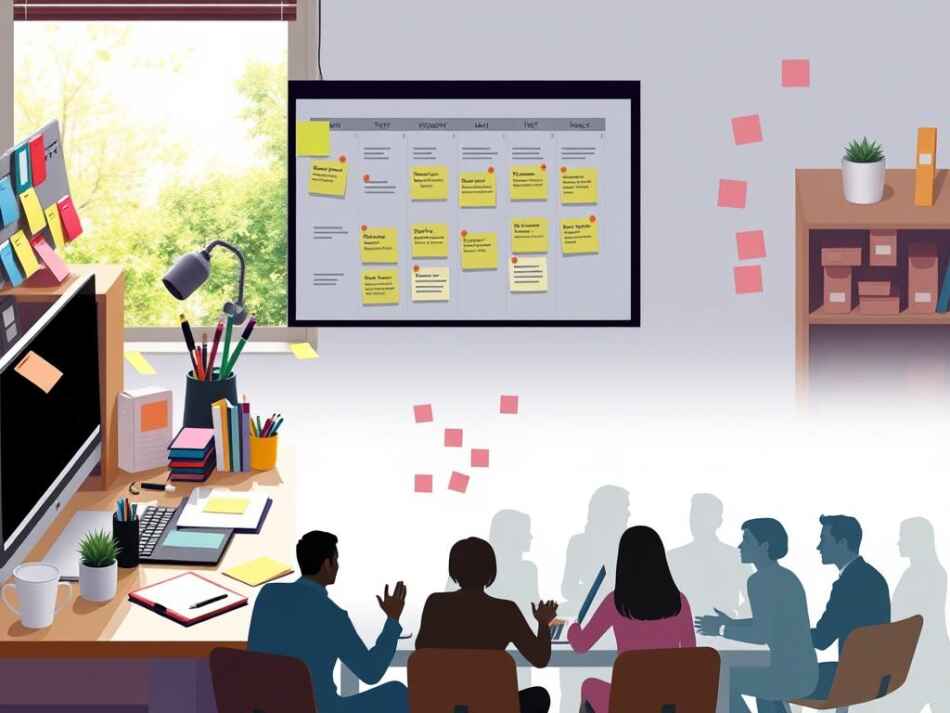I’ve been there. Staring at a blank screen, knowing I should start that important project, but finding every excuse to delay. The struggle with procrastination is real, and it’s one I’ve grappled with for years. But through my journey, I’ve discovered it’s not about laziness – it’s far more complex than that.
Procrastination has deep roots in human nature. Even ancient Greek philosophers like Socrates recognized this tendency to act against our better judgment. They called it “Akrasia” – a lack of self-control that’s all too familiar in our modern world of constant distractions.
Why do we do this to ourselves? Research points to our brain’s bias towards instant gratification. We prioritize the present over the future, leading to that classic procrastination cycle. But here’s the good news – understanding these patterns is the first step to breaking free.
In my quest to improve focus and master time management, I’ve uncovered some game-changing strategies. From the “Two-Minute Rule” to the Pomodoro Technique, there are practical tools we can use to overcome our procrastination tendencies.
This article dives into the science behind why we procrastinate and offers proven tips to boost productivity. Whether you’re a chronic procrastinator or just looking to fine-tune your focus, you’ll find actionable advice to help you tackle your to-do list with renewed energy.
Understanding the Science Behind Procrastination
I’ve always wondered why we delay things. It’s not just laziness. In fact, 80% of procrastinators work hard just before deadlines. Let’s explore the science and find ways to stay motivated.
The Psychology of Delay
Procrastination is a way to protect ourselves. It gives us a reason if we fail. This is true for students and those under a lot of pressure. Knowing why we procrastinate is the first step to stop it.
Present Bias and Evolutionary Origins
Our brains love immediate rewards over long-term goals. This “present bias” helped us survive in the past. But now, it slows us down. Understanding this bias helps us stay motivated.
The Role of Dopamine and Instant Gratification
Dopamine, our reward chemical, plays a big role in procrastination. It makes us want quick rewards, not long-term goals. To fight this, I break tasks into smaller parts. This “Swiss Cheese” method gives us quick wins, boosting our motivation.
| Procrastination Factor | Impact | Productivity Hack |
|---|---|---|
| Self-protection mechanism | Ready excuse for potential failure | Positive self-talk and realistic goal-setting |
| Present bias | Prioritizing immediate rewards | Breaking tasks into smaller, manageable parts |
| Dopamine-driven instant gratification | Difficulty focusing on long-term tasks | Using the “Swiss Cheese” approach for quick wins |
Common Myths About Procrastination Debunked
I’ve heard many wrong ideas about procrastination. Let’s set the record straight. First, procrastination isn’t just about being lazy. In fact, nearly 20% of people struggle with it, often due to fear or wanting to be perfect.
Another myth is that working under pressure makes things better. But this is not true. Chronic procrastination can cause 12 health problems, like anxiety and heart disease. It’s not a smart way to work; it’s harmful to your health.
Some people think they’re not procrastinating if they meet deadlines. But that’s not right. Even if you’re on time, the stress of rushing can hurt you. A study showed that 46% of people see procrastination as a big stress. And 18% say it affects their mental health.
| Myth | Reality |
|---|---|
| Procrastination is laziness | Often linked to fear or perfectionism |
| Pressure produces better work | Can lead to 12 different health issues |
| Meeting deadlines means no procrastination | 46% see it as a personal stressor |
It’s important to know these myths to manage our time better. Instead of believing these lies, try real tips like the Pomodoro technique. By debunking these myths, we can fight procrastination and get more done.
The Hidden Impact of Chronic Procrastination on Health
I’ve found out that chronic procrastination is more than just missing deadlines. It can really hurt our health. About 20% of U.S. adults are chronic procrastinators. They face risks beyond just work stress. Let’s look at how putting things off affects our well-being and why self-motivation is key for being productive.
Physical Health Consequences
Procrastination hurts our bodies. It’s linked to bad sleep, not moving enough, and other health problems. These issues can get worse, making it harder to stop delaying things.
Mental Health Effects
The mental side is just as bad. Chronic procrastination often goes with depression, anxiety, and ADHD. It’s a tough cycle – these conditions can cause procrastination, and procrastination can make them worse.
Stress-Related Complications
Always putting things off leads to stress. This stress can cause headaches, stomach problems, and more. It’s clear we need to find ways to be more productive for our health.
| Health Issue | Percentage of Procrastinators Affected |
|---|---|
| Depression | 45% |
| Anxiety | 50% |
| Poor Sleep Quality | 60% |
| Physical Inactivity | 55% |
Identifying Your Procrastination Triggers
I often find myself putting off tasks, struggling with focus improvement and time management. Tim Pychyl, a psychology professor at Carleton University, explains procrastination as “a purely visceral, emotional reaction to something we don’t want to do.” Understanding this helped me realize the importance of identifying my personal triggers.
Through research, I discovered that procrastination triggers can vary widely. Some common ones include boredom, frustration, task difficulty, and lack of personal meaning. Recognizing these triggers is crucial for developing strategies to overcome them and boost productivity.
To better understand my own triggers, I started tracking my behavior. I noticed patterns emerging. Vague instructions often left me feeling uncertain, leading to delays. Unstructured tasks without clear deadlines tended to fall by the wayside. Tasks lacking intrinsic rewards were harder to start.
By identifying these triggers, I’ve been able to implement targeted strategies for focus improvement. For instance, I now break down complex tasks into smaller, manageable steps. I also create a more structured environment to minimize distractions, which has significantly improved my time management skills.
| Common Trigger | Strategy |
|---|---|
| Boredom | Find ways to make tasks more engaging |
| Task Difficulty | Break tasks into smaller, manageable steps |
| Lack of Clarity | Seek clarification and set specific goals |
| Perfectionism | Set realistic expectations and deadlines |
Remember, everyone’s triggers are unique. By identifying yours, you can develop personalized strategies to overcome procrastination and improve your productivity.
The Connection Between Emotions and Task Avoidance
Emotions greatly affect why we delay tasks. Procrastination isn’t just about bad time management. It’s also linked to how we feel. Stress can make our brain avoid, making them harder to do.
Fear and Self-Doubt
Fear of failure and self-doubt block our productivity. These feelings can make simple tasks seem huge. Breaking big tasks into smaller steps helps a lot.
Anxiety and Perfectionism
Anxiety and perfectionism often lead to procrastination. The fear of not doing something perfectly can freeze us. I’ve learned to focus on making progress, not being perfect.
Emotional Regulation Strategies
Learning to manage our emotions is crucial to beat procrastination. Being kind to ourselves and changing negative thoughts helps a lot. Using timers for work and breaks also helps manage stress and boosts productivity.
| Strategy | Benefit |
|---|---|
| Task Breakdown | Reduces overwhelm |
| Self-Compassion | Lessens negative self-talk |
| Timed Work Sessions | Improves focus and productivity |
Understanding why we procrastinate helps us find better ways to fight it. It’s all about making progress, not being perfect. Start small, be kind to yourself, and keep moving forward.
Overcoming Procrastination Through Self-Awareness

Self-awareness is key to beating procrastination. Did you know 20% of adults are chronic procrastinators? But, knowing our habits helps us overcome it.
One good tip is to list your delay tactics. Seeing how often you do lower priority tasks is eye-opening. It helps you stay focused on what’s important.
It’s also important to know what makes you procrastinate. For many, it’s fear of failure or wanting to be perfect. By facing these feelings, we can improve our focus.
Try this simple exercise: when you procrastinate, pause and ask why. Are you on social media or reorganizing? Knowing your habits helps you stop them.
Beating procrastination is a journey. Self-awareness helps us be more productive and reach our goals. It’s about recognizing patterns and making small changes.
Time Management Techniques That Actually Work
Mastering time management is key for college success. A 2023 study by the College Time Management Institute shows 75% of students struggle with time organization. This struggle often leads to stress and poor grades. Let’s look at some productivity hacks to help.
The Pomodoro Technique Explained
The Pomodoro Technique is a simple yet powerful method. It involves working in focused 25-minute intervals, followed by short breaks. This helps keep focus and prevents burnout. Research shows it can boost productivity by up to 40%.
Task Chunking Methods
Task chunking breaks big projects into smaller pieces. This makes big tasks feel less scary. By using task chunking, students can see a 30% increase in academic success.
Strategic Planning Approaches
Creating flexible schedules is crucial for time management. The Academic Success and Achievement Program says students who plan tasks well are 50% less likely to fall behind. Using apps for college students can help with planning.
| Time Management Technique | Benefit | Success Rate |
|---|---|---|
| Pomodoro Technique | Improved focus and productivity | 40% increase |
| Task Chunking | Better project management | 30% increase in academic success |
| Strategic Planning | Reduced likelihood of falling behind | 50% decrease in missed deadlines |
Building Productive Habits and Routines
Creating productive habits helps beat procrastination. The Two-Minute Rule is a big help. It means starting with habits that take less than two minutes. This builds self-motivation and focus.
I started by reading one page before bed. Soon, I loved reading more. I also began by just taking out my yoga mat. These small steps led to longer, better workouts.
Being consistent is key. Showing up daily, even for two minutes, helps. It has made my workout routine strong. This boosts my self-motivation a lot.
To track my progress, I use a simple table:
| Habit | Mon | Tue | Wed | Thu | Fri | Sat | Sun |
|---|---|---|---|---|---|---|---|
| Read 1 page | ✓ | ✓ | ✓ | ✓ | ✓ | ✓ | ✓ |
| 2-min workout | ✓ | ✓ | ✓ | ✓ | ✓ | – | ✓ |
| Study notes | ✓ | ✓ | – | ✓ | ✓ | ✓ | – |
It’s better to do less than planned than nothing. Start small, be consistent. Watch your productivity grow as you build strong habits and routines.
The Power of Social Capital in Beating Procrastination
Using social capital can really help us beat procrastination. It helps us work better and manage our time well. Let’s look at some ways to use our social connections to fight procrastination.
Leveraging Support Systems
Support systems are key to staying on track. Sharing my goals with friends or family makes me more likely to achieve them. It’s because we all want to be respected by others.
When I share my plans, I’m more motivated to do them. This way, I don’t want to let others down.
Accountability Partnerships
Having an accountability partner has changed my life. I team up with someone who has similar goals. We meet up often to talk about our progress and problems.
This support keeps us motivated and on schedule. It helps us finish tasks on time.

Community Motivation
Being part of a community has really helped me. It could be a study group or an online forum. Being with others who think like us is very encouraging.
We share tips on managing time, celebrate our wins, and help each other when we’re down.
| Social Capital Strategy | Benefits |
|---|---|
| Support Systems | Increased accountability, higher goal achievement |
| Accountability Partnerships | Regular check-ins, mutual motivation |
| Community Motivation | Shared knowledge, encouragement, diverse perspectives |
Using these social capital strategies has really helped me. They make me more productive and create a supportive environment. This makes it easier and more fun to do tasks.
Digital Distractions and How to Manage Them
Digital distractions are a big problem for improving focus. Today, our phones, social media, and online content can mess up our work. Studies show many students get sidetracked by their phones or social media while studying.
To fight these distractions, I’ve found some good tips. Having a special study area and setting goals helps a lot. Apps like Forest make staying focused fun. Taking short breaks between work sessions also boosts my productivity.
It’s key to handle digital distractions to beat procrastination. Turning off tech and using noise-canceling headphones helps a lot. Tools like LeechBlock block distracting websites. Try different methods to find what works best for you.
Procrastination Tips
Here are some procrastination tips you can use. Procrastination is not just about being lazy or lacking discipline. It’s a complex issue that involves our psychology, emotions, and environment. When we delay tasks, it’s often because we feel overwhelmed, anxious, or unsure. Instead of criticizing ourselves, we should try to understand why we procrastinate.
By recognizing that procrastination is common, we can start to find better ways to deal with it. This approach helps us be kinder to ourselves and more supportive in our efforts to overcome procrastination.
Breaking down big tasks into smaller ones is a great way to fight procrastination. It makes the task less daunting and helps us feel more in control. By focusing on one thing at a time, we build confidence and a sense of achievement.
Using the Pomodoro Technique is a helpful strategy. It involves working in focused 25-minute bursts, followed by a five-minute break. This method keeps us from getting burned out and helps us make progress on tough tasks.
Procrastination often comes from a lack of motivation or self-compassion. To beat this, we need to grow our self-confidence and have a positive view of ourselves and our work. This means taking care of ourselves, setting achievable goals, and celebrating our small victories.
Being kind to ourselves and acknowledging our strengths is key. We should also learn from our mistakes without being too hard on ourselves. Celebrating our successes and learning from our failures helps us grow and stay motivated.
FAQ
What is procrastination, and why do we do it?
How does procrastination affect our health?
What are some common myths about procrastination?
How can I identify my procrastination triggers?
What role do emotions play in procrastination?
What are some effective time management techniques to reduce procrastination?
How can I build productive habits to prevent procrastination?
How can social connections help in overcoming procrastination?
How can I manage digital distractions to improve focus?
What’s the science behind why we procrastinate?
Source Links
- https://jamesclear.com/procrastination – Procrastination: A Scientific Guide on How to Stop Procrastinating
- https://www.linkedin.com/pulse/10-proven-strategies-overcome-procrastination-when-starting-lieff-qyn1e?trk=public_post_main-feed-card_feed-article-content – 10 Proven Strategies to Overcome Procrastination When Starting a New Project
- https://medium.com/the-focus-factor/how-to-finally-stop-procrastinating-5-proven-strategies-for-productivity-ce9638990890 – Beat Procrastination for Good: 5 Proven Strategies to Skyrocket Your Productivity
- https://mcgraw.princeton.edu/undergraduates/resources/resource-library/understanding-and-overcoming-procrastination – Understanding and Overcoming Procrastination
- https://www.psychologicalscience.org/observer/why-wait-the-science-behind-procrastination – Why Wait? The Science Behind Procrastination
- https://online.nursing.georgetown.edu/blog/how-to-stop-procrastinating-there-is-a-science-to-it/ – How to Stop Procrastinating: There Is a Science to It
- https://www.linkedin.com/pulse/procrastination-workplace-debunking-laziness-myth – Procrastination at the Workplace: Debunking the Laziness Myth and Embracing Effective Strategies
- https://www.frankberlin.com/journal/procrastination-the-hidden-mental-health-challenge?srsltid=AfmBOopQmM9WqxhDyv8a83WPEWyoaL31iP2TdF4SaMF_Bx8Xc5YDYF-c – Procrastination: The Hidden Mental Health Challenge — FRANK BERLIN
- https://resiliencyclinic.com/the-psychology-behind-procrastination-unveiled/ – The Hidden Psychology Behind Procrastination | Resiliency Clinic
- https://nesslabs.com/procrastination-triggers – Procrastination triggers: eight reasons why you procrastinate
- https://medium.com/@efbombcoach/identifying-and-managing-procrastination-triggers-9a6ad9527bbf – Identifying and Managing Procrastination Triggers
- https://www.linkedin.com/pulse/what-your-procrastination-trigger-lisa-mallis?trk=article-ssr-frontend-pulse_more-articles_related-content-card – What is Your Procrastination Trigger?
- https://www.edutopia.org/article/addressing-emotional-roots-procrastination/ – Addressing the Emotional Roots of Procrastination
- https://www.counseling.org/publications/counseling-today-magazine/article-archive/article/legacy/procrastination-an-emotional-struggle – Procrastination: An emotional struggle
- https://www.bbc.com/worklife/article/20200121-why-procrastination-is-about-managing-emotions-not-time – Why procrastination is about managing emotions, not time
- https://www.portagepath.org/procrastination-demystified/ – Procrastination Demystified: Your Guide to Taking Action
- https://chalene.com/self-awareness-procrastination/ – Self-Awareness and Procrastination – CHALENE JOHNSON
- https://www.colorado.edu/studentaffairs/2024/01/20/tips-manage-your-time-better – Tips to manage your time better
- https://caps.ucsc.edu/resources/time-management.html – Time Management and Procrastination
- https://jamesclear.com/how-to-stop-procrastinating – How to Stop Procrastinating by Using the “2-Minute Rule”
- https://medium.com/the-ascent/overcoming-procrastination-9ca4178a8fcf – Overcoming Procrastination
- https://www.acacia.edu/blog/conquering-procrastination-practical-techniques-that-work/ – Conquering Procrastination: Practical Techniques That Work | Acacia
- https://medium.com/the-mission/how-to-hack-your-brain-to-destroy-procrastination-and-accomplish-more-in-life-according-to-harvard-adb84345892f – How to Hack Your Brain to Destroy Procrastination, According to Harvard Research
- https://greatergood.berkeley.edu/article/item/two_Counterintuitive_ways_to_stop_procrastinating – Two Counterintuitive Ways to Stop Procrastinating
- https://learningcenter.unc.edu/tips-and-tools/decreasing-digital-distractions/ – Digital Distractions – Learning Center
- https://www.apu.apus.edu/area-of-study/education/resources/how-do-i-stop-procrastinating-in-online-school/ – How Do I Stop Procrastinating in Online School?
- https://bellarminelion.com/features/2024/10/31/digital-technology-a-source-of-procrastination/ – Digital technology: A source of procrastination

